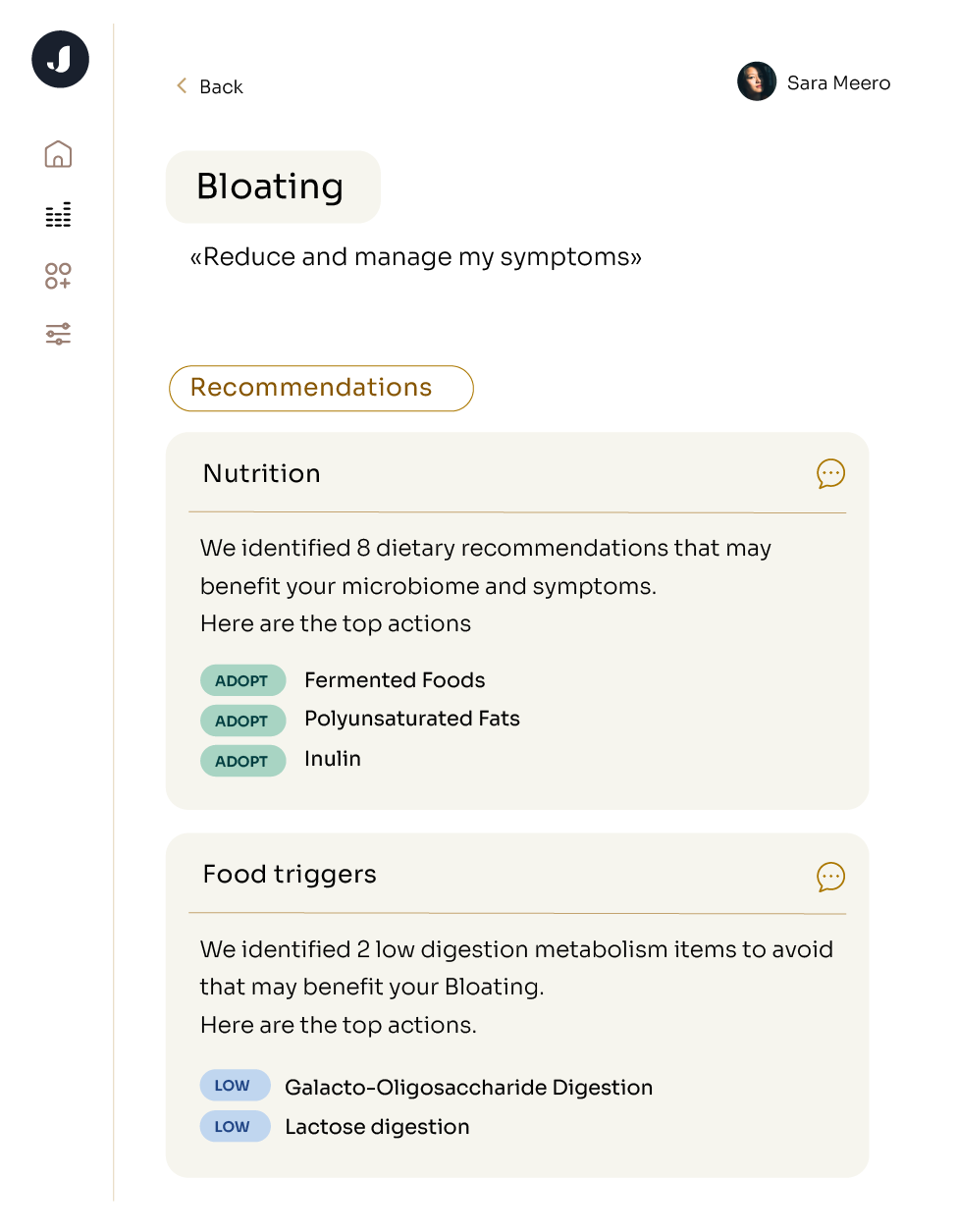10 Reasons To Test Your Gut Microbiome
Edwina Clark, MS, RD, CSSD
Key Takeaways
-
Microbiome testing provides unique insights into your health and can be valuable for understanding brain, gastrointestinal, skin, and metabolic health, among other things.
-
Shotgun metagenomic microbiome testing offers the deepest insight into your microbiome and identifies the largest range of microorganisms compared to other sequencing risks.
-
Microbiome testing is not a diagnostic tool, nor is it a treatment. However, it offers insight into a uniquely broad range of health risks and allows you to make lifestyle changes to prevent and possibly mitigate a range of health conditions.
The gut microbiome is arguably the hottest topic in health right now, with over 2000 studies published every month. And with that, has come dozens of products offering to decode and optimize your inner ecosystem. While gut interventions like probiotics have been popular for years, microbiome testing is starting to take off. But what is it? Is it useful? And what can it tell you about your health?
What is Gut Microbiome Testing?
Put simply, microbiome testing involves collecting a small stool sample using a special testing kit, mailing it or dropping it into a lab, and receiving a report about the microbes in your gut.
Sequencing techniques vary from test to test, and differ in accuracy and the number of microorganisms they can detect. Some tests can detect parasites, while others cannot. Similarly, some tests identify viruses and fungi, while others do not have the same capabilities.
Types of sequencing:
-
PCR: Amplifies DNA sequences and detects 20-30 common microorganisms
-
16S rRNA gene: Identifies bacteria at genus/occasionally species level but cannot detect viruses, fungi, or archaea.
Shotgun Metagenomic: Identifies all DNA in a stool sample, including bacteria, fungi, viruses, parasites, archaea, and more. This type of sequencing is the most comprehensive and can identify 200-500 species residing in your gut. At Jona, we use Shotgun Metagenomic sequencing to get a comprehensive picture of your microbiome.
Read more about the pros and cons of each sequencing method here.
The cost of microbiome testing varies, depending on the sequencing technique. 16S rRNA gene microbiome tests typically cost $80-200 but yield fewer insights about your microbiome because they only identify bacteria. On the other hand, shotgun metagenomic tests cost $200-500+ and offer a comprehensive picture of the microorganisms in your gut.
What Are The Benefits of Gut Microbiome Testing?
#1: One Test, Dozens of Health Insights
Shotgun metagenomics microbiome tests (like Jona) identify 200-500 species of bacteria, fungi, viruses, and parasites, revealing dozens of insights into your health. Your gut microbiome, in conjunction with other markers, is an indicator of brain health, gastrointestinal health, skin health, metabolic health, and more [1].
#2: Catch Health Risks Before They Become Symptoms
Conditions such as psoriasis, acne, ulcerative colitis, Crohn’s disease, prediabetes and diabetes, insomnia, Parkinson’s disease, and depression have all been linked with distinct microbial signatures [1]. Microbiome testing can help you understand hidden health risks lurking within your gut and take actions to mitigate the likelihood of you developing certain conditions [1, 2].
#3: Lifestyle Can Change Your Microbial Makeup
One of the best things about your microbiome is that you have the power to alter it and shift your health risk. Thousands of studies indicate that diet, sleep, stress, and exercise can shift the microbial makeup of your gut [3].
#4: It Can Save You Money in the Long Run.
While a shotgun metagenomics microbiome test might seem like a big investment, it can help you identify hidden health risks and take action to prevent costly medical problems. Moreover, it can help you identify the best nutrition interventions for your individual microbiome, rather than spreading money needlessly on probiotics and supplements that aren’t right for you.
#5: It Can Impact Your Skin
Skin conditions such as acne, rosacea, psoriasis, eczema, and chronic hives have been linked with specific alterations in the gut microbiome [2]. Shotgun microbiome testing can identify skin-specific alterations in your gut microbiome and take corrective action to help alleviate skin issues.
#6: It Can Impact Your Brain
The gut-brain connection is well-established, and a growing body of evidence suggests that the microbial composition of your gut impacts your risk of anxiety, depression, Parkinson’s disease, migraines, and even PTSD [1,4]. Shotgun microbiome testing helps identify microbial signatures related to brain health and make lifestyle choices to promote specific shifts.
#7: It Can Impact Your Physical Performance
One of the lesser-known microbiome-health relationships is the impact that your inner ecosystem has on physical performance. Conditions such as osteoporosis and osteoarthritis have distinct microbial signatures [5,6]. Similarly, insomnia and chronic fatigue have been linked with microbial shifts, and microbiome testing can help identify and possibly mitigate these issues [7, 8].
#8: It Can Affect Your Gastrointestinal Function
Changes in the gut microbiome is associated with a variety of GI issues including Chrohn’s disease, ulcerative colitis, IBS, and constipation [1,3,9]. Gut microbiome testing is a promising way to identify specific microbiome shifts linked to these diseases and provide hypertargeted lifestyle interventions to correct dysbiosis.
#9: It Can Affect Metabolic Health and Heart Disease Risk
Microbial shifts in the gut are linked to a wide range of metabolic issues including pre-diabetes and diabetes, metabolic syndrome, high blood pressure, and thyroid disease, all of which have been linked to heart disease risk [1,10,11]. Gut-based interventions, alongside traditional lifestyle changes, are increasingly being used to reduce the risk and progression of metabolic health issues, and microbiome testing can help identify and correct microbiome shifts associated with metabolic disease.
#10: It Can Impact Your Immune System
The gut microbiome is an important protective barrier between us and the outside world and plays a critical role in immune function. Various autoimmune conditions including Chrohn’s disease, ulcerative colitis, psoriasis, and Hashimoto’s disease are linked with dysbiosis and defined microbial signatures [1-11]. Moreover, studies indicate that probiotics may be helpful for preventing and mitigating upper respiratory infections, asthma, and other immune conditions [12, 13]. Microbiome testing can provide valuable insights into autoimmune disease risk as well as general immune health.
Who Shouldn’t Test Their Microbiome/ Contraindications
Testing your microbiome via a stool sample comes with little risk, and there are no real contraindications. That being said, antibiotics can have a significant impact on your microbiome, and if you are currently on antibiotics, you may want to wait at least two weeks to get a better sense of what your usual microbiome composition.
Summary
Microbiome testing can provide unique insights into overall health, including brain, gastrointestinal, skin, and metabolic well-being. Shotgun metagenomic sequencing offers the most comprehensive view, identifying the widest range of microorganisms for the deepest understanding of your microbiome. While not a diagnostic tool or treatment, these tests can highlight potential health risks and help guide lifestyle changes to prevent—or potentially mitigate—a variety of conditions.
References
[1] Hou, K., Wu, Z., Chen, X., Wang, J., Zhang, D., Xiao, C., Zhu, D., Koya, J. B., Wei, L., Li, J., & Chen, Z. (2022). Microbiota in health and diseases. Signal Transduction and Targeted Therapy, 7(1), 1-28. https://doi.org/10.1038/s41392-022-00974-4
[2] Mahmud, M. R., Akter, S., Tamanna, S. K., Mazumder, L., Esti, I. Z., Banerjee, S., Akter, S., Hasan, M. R., Acharjee, M., Hossain, M. S., & Pirttilä, A. M. (2022). Impact of gut microbiome on skin health: Gut-skin axis observed through the lenses of therapeutics and skin diseases. Gut Microbes, 14(1), 2096995. https://doi.org/10.1080/19490976.2022.2096995
[3] Aziz, T., Hussain, N., Hameed, Z., & Lin, L. (2024). Elucidating the role of diet in maintaining gut health to reduce the risk of obesity, cardiovascular and other age-related inflammatory diseases: recent challenges and future recommendations. Gut Microbes, 16(1). https://doi.org/10.1080/19490976.2023.2297864
[4] Loh, J. S., Mak, W. Q., Tan, L. K., Ng, C. X., Chan, H. H., Yeow, S. H., Foo, J. B., Ong, Y. S., How, C. W., & Khaw, K. Y. (2024). Microbiota–gut–brain axis and its therapeutic applications in neurodegenerative diseases. Signal Transduction and Targeted Therapy, 9(1), 1-53. https://doi.org/10.1038/s41392-024-01743-1
[5] Meléndez-Oliva, E., Martínez-Pozas, O., Sinatti, P., Martín Carreras-Presas, C., Cuenca-Zaldívar, J. N., Turroni, S., & Sánchez Romero, E. A. (2025). Relationship Between the Gut Microbiome, Tryptophan-Derived Metabolites, and Osteoarthritis-Related Pain: A Systematic Review with Meta-Analysis. Nutrients, 17(2), 264. https://doi.org/10.3390/nu17020264
[6] Wang, Z., Wang, W., Wang, Y., Hu, H., Wang, B., Zhu, W., Li, X., Hou, X., Sun, W., Liu, Z., Lu, S., & Chen, X. (2025). Mapping gut microbiota and metabolite alterations in patients with postmenopausal osteoporosis in the Beijing Community of China. European journal of medical research, 30(1), 539. https://doi.org/10.1186/s40001-025-02795-x
[7] Wang, Y., Xie, S., Chen, S., Li, C., Chan, Y. L., Chan, N. Y., Wing, Y. K., Chan, F. K. L., Su, Q., & Ng, S. C. (2025). The Role of Gut Microbiota in Insomnia: A Systematic Review of Case-Control Studies. Life (Basel, Switzerland), 15(7), 1086. https://doi.org/10.3390/life15071086
[8] Xiong, R., Aiken, E., Caldwell, R., Vernon, S. D., Kozhaya, L., Gunter, C., Bateman, L., Unutmaz, D., & Oh, J. (2025). AI-driven multi-omics modeling of myalgic encephalomyelitis/chronic fatigue syndrome. Nature medicine, 10.1038/s41591-025-03788-3. Advance online publication. https://doi.org/10.1038/s41591-025-03788-3
[9] Chin, S. W., Low, Z. Y., Tan, W. Q., & Azman, A. S. (2025). Microbiota-Host Interactions: Exploring Their Dynamics and Contributions to Human Diseases. MicrobiologyOpen, 14(4), e70043. https://doi.org/10.1002/mbo3.70043
[10] Ludgate, M. E., Masetti, G., & Soares, P. (2024). The relationship between the gut microbiota and thyroid disorders. Nature Reviews Endocrinology, 20(9), 511-525. https://doi.org/10.1038/s41574-024-01003-w
[11] Fliegerová, K. O., Mahayri, T. M., Sechovcová, H., Mekadim, C., Mrázek, J., Jarošíková, R., Dubský, M., & Fejfarová, V. (2025). Diabetes and gut microbiome. Frontiers in Microbiology, 15, 1451054. https://doi.org/10.3389/fmicb.2024.1451054
[12] Cheevadhanarak, S., Yasom, S., Kerdphoo, S., Thiennimitr, P., Phrommintikul, A., Chattipakorn, N., Kittichotirat, W., & Chattipakorn, S. (2020). Gut Microbiota Profiles of Treated Metabolic Syndrome Patients and their Relationship with Metabolic Health. Scientific Reports, 10(1), 1-11. https://doi.org/10.1038/s41598-020-67078-3
[13] Sadrifar, S., Abbasi-Dokht, T., Forouzandeh, S., Malek, F., Yousefi, B., Salek Farrokhi, A., Karami, J., & Baharlou, R. (2023). Immunomodulatory effects of probiotic supplementation in patients with asthma: a randomized, double-blind, placebo-controlled trial. Allergy, asthma, and clinical immunology : official journal of the Canadian Society of Allergy and Clinical Immunology, 19(1), 1. https://doi.org/10.1186/s13223-022-00753-4






